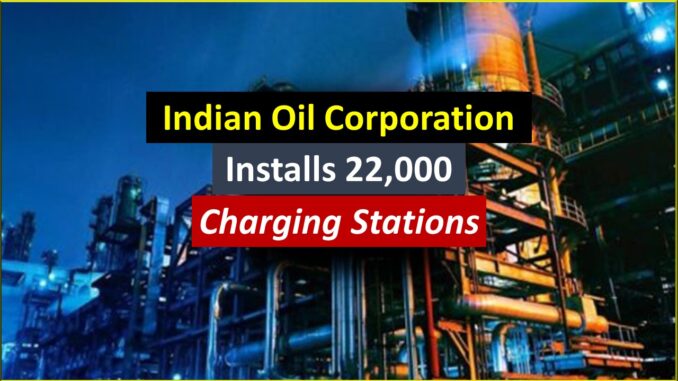
India is on the fast track of expanding their EV infrastructure with the help of India’s OMCs (Oil marketing companies). Indian Oil Corporation (IOC), Bharat Petroleum Ltd (BPCL) and Hindustan Petroleum (HPCL) have promised to create 22,000 charging stations by the end of 2026, as a result, the EV infrastructure in the company will be able to cater for the demand.
From 2021 onwards, IOC is working on installing 10,000 EV charging stations at their outlets. The plan was officially declared by Indian Oil Chairman Shrikant Madhav Vaidya in 2021. Likewise, Bharat Petroleum Corporation said in a separate news release they will also commission 7,000 charging stations during the same period. Whereas Hindustan Petroleum is aiming to open 5000 EV charging stations throughout their outlets.
Let us look deeper into each one of their plans.
Indian Oil: From Filling Petrol To Charging EVs
IndianOil is a state-owned company under the Indian Ministry of Petroleum and Natural Gas, and is leading the push for EV charging station opening. According to the chairman, the company’s initial phase will concentrate on nine cities. Mumbai, Delhi, Bangalore, Hyderabad, Ahmedabad, Chennai, Kolkata, Surat, and Pune will be the first nine cities.
The company hopes to improve the EV ecosystem in the country by their meticulously made actionable plan.
IndianOil is working with Tata Power, Fortum, Hyundai, Tech Mahindra, and other tech companies for the project. The company already has 448 EV charging stations and 30 battery-swapping stations across the country.
The IOC plans to focus on chargers that are suitable for 2W or 3W for expansion, but they may improve further based on demand and market conditions.
IndianOil has taken other initiatives like hybrid microgrids linked to EV chargers in Bangalore which is made possible with the help of Hygge Energy. Also, IOC has ventured into aluminium-air battery technology to further expand the EV eco system in the country in a 50:50 joint venture with Phinergy from Israel.
BPCL: Aiding In EV Penetration
BPCL is claimed to be the second-biggest OMC in India and is owned by the Indian government. According to the chairman and managing director of the company Mr.Arun Kumar Singh, the company is aiming to reach the count of 7,000 charging stations called Energy Stations to support the growing EV industry in the coming years.
These stations will be called “Energy Stations.” In India, BPCL currently has 19,000 outlets and the company hasn’t revealed the location of the EV charging stations.
HPCL: Looking For Alternative Technologies For EV Charging
The last player in the game, Hindustan Petroleum Corporation (HPCL), is another state-owned company that promised to install 5,000 charging stations even though they have only 84 EV charging stations at the moment. HPCL also has agreements with Tata Power, Convergence Energy Services Ltd. (CESL), and Magenta EV Systems to install charging infrastructure at their retail locations.
In contrast to its rivals, HPCL also introduced a patented EV charging setup in partnership with Magenta EV Systems. The goal is to integrate the setup into street lights for curbside charging. The infrastructure to cater to the needs of the two- and three-wheeler sector is also part of the plans of HPCL.
Over the next 10 years, the business stated, charging stations would be put at a few retail locations in Mumbai, Delhi NCR, Bengaluru, Hyderabad, Chennai, Kolkata, and Pune.
EV Eco system Backed By The Government
The Indian government is pushing the EV charging station infrastructure through nations’ OMCs. The OMCs, which include Indian Oil, Bharat Petroleum, and Hindustan Petroleum, are eligible for a ₹800 crore subsidy under the government’s Faster Adoption and Manufacturing of Hybrid and Electric Vehicles (FAME-II) programme. 22,000 public EV charging stations are being deployed by the Ministry of Petroleum & Natural Gas, with completion scheduled for December 2024.
Of these, 7,432 stations are being put into service as part of the Ministry of Heavy Industry’s FAME-II programme. According to this regulation, EV charger manufacturers must achieve a minimum of 50% domestic value addition to be qualified under the FAME-II plan by December 1, 2024,
Conclusion
India has long implemented incentive schemes to boost the adoption of electric vehicles. For instance, in June of this year, the government decided to prolong the FAME II subsidies programme through May 31, 2024. Under the FAME II subsidy programme, 1.4 billion dollars worth of subsidies are available.
Additionally, funding for 2,636 charging stations and nearly 5,600 electric buses was granted in the summer of 2019 and the beginning of 2020. India intends to encourage EV production this year, and the country may eliminate its infamously high import taxes on electric cars.
The “biggest democracy” in the world promised to become carbon neutral by 2070 at the Climate Summit COP26 in Glasgow and all these efforts will make it possible.
You May Also Like